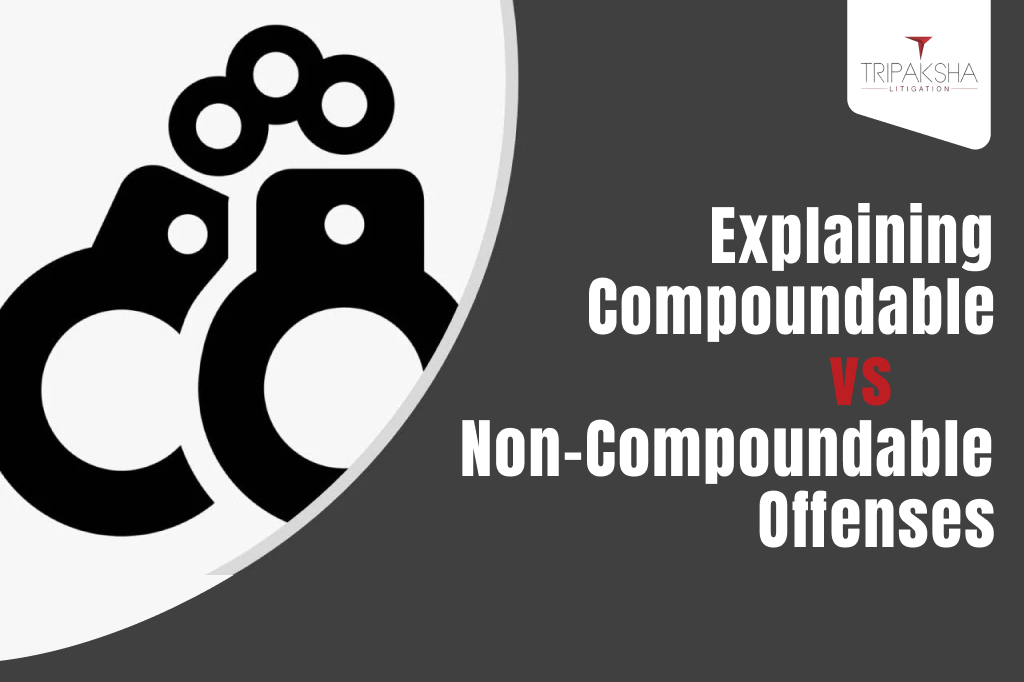Explore the realm of compoundable and non-compoundable offenses, unraveling their disparities and implications within the Indian legal framework. Delve into the intricacies of the law, understanding the repercussions and pertinent examples. Receive expert insights and clarity on this crucial legal subject.
We’re all acquainted with the Latin maxim “interest reipublicae ut sit finis litium,” emphasizing the state’s interest in minimizing litigation. Countless cases have lingered in high courts and subordinate courts for prolonged periods. Legislation offers the criminal justice system a potent tool capable of significantly reducing case resolution time: the compounding of offenses.
To gain a deeper understanding, watch this video elucidating compoundable and non-compoundable offenses:
Compoundable Offense
The concept of compoundable offenses is outlined in Section 320 of the Code of Criminal Procedure (CrPC), 1973. These offenses involve situations where the aggrieved party, typically the complainant, chooses to withdraw charges against the accused. However, such settlements are expected to occur “in utmost good faith.” Compounding a compoundable offense can occur either with or without the court’s consent. The complainant may seek court permission to compound the offense in the same court where the initial complaint was lodged.
No Court Permission Necessary
Within Section 320(1) lies a list enumerating offenses that can be compounded without seeking consent or permission from the court. Some illustrations of these offenses include:
- Adultery – Section 497, IPC
- Voluntarily causing hurt – Section 323, IPC
- Defamation – Section 500, IPC
- Criminal trespass – Section 447, IPC
Typically, these offenses are of a private nature and are not deemed to pose a threat to public welfare or the state’s interests. However, grave crimes such as rape, murder, and dacoity are exempt from compounding.
Court Consent Necessary
Section 320(2) delineates a list representing the second category of offenses wherein the court’s permission is obligatory before parties can reconcile. Instances of such offenses include:
- Theft – Section 379, IPC
- Criminal breach of trust – Section 406, IPC
- Voluntarily causing grievous hurt – Section 325, IPC
- Assault on a woman with the intention to outrage her modesty – Section 354, IPC
- Dishonest misappropriation of property – Section 403, IPC
Implications of Compounding
Section 320(8) outlines the repercussions of compounding an offense, resulting in the exoneration of the accused with whom the offense was compounded. Essentially, this action entails the dismissal of all accusations levied against the accused party. Whether an FIR was filed or the trial had commenced holds no significance; once the offense is compounded with the court’s approval, the offender is absolved of all charges.
Non-Compoundable Offenses
Non-compoundable offenses are not subject to compromise; rather, they necessitate a complete trial. These offenses are of a more serious and grave nature, impacting society at large rather than solely the individual victim. The prohibition against compounding such offenses arises from the concern that doing so would condone serious offenses within society. Due to their violation of public policy, non-compoundable offenses cannot be resolved through ordinary court settlement. It is imperative that they undergo trial without the option for compromise. Even the court lacks the authority to compound such offenses. A full trial ensues, culminating in either the acquittal or conviction of the offender based on presented evidence. Since offenses not enumerated in Section 320 of the Criminal Procedure Code are deemed non-compoundable, the list of such offenses is not exhaustive.
Difference Between Compoundable and Non-Compoundable Offence
Compoundable and non-compoundable offenses are two distinct categories within the legal framework that governs the Indian judicial system. The primary disparity between these offenses lies in their treatment and resolution processes.
Compoundable offenses are those where the aggrieved party, typically the complainant, has the authority to withdraw the charges against the accused. These offenses can be settled through a compromise between the involved parties, often with the payment of compensation or other agreed-upon terms. The decision to compound such offenses can be made either with or without the court’s consent, depending on the specific provisions outlined in the law.
Examples of compoundable offenses include minor disputes like simple assault, defamation, or certain property offenses.
On the contrary, non-compoundable offenses are more severe in nature and cannot be resolved through compromise or withdrawal of charges by the complainant. These offenses are considered to be against public policy and pose a threat to societal order and welfare. As a result, they require a full trial process to determine the guilt or innocence of the accused. Even if the aggrieved party wishes to forgive the offender, the law mandates that such offenses must undergo legal proceedings. Non-compoundable offenses include heinous crimes such as rape, murder, and offenses against the state.
The distinction between compoundable and non-compoundable offenses is crucial in determining the appropriate legal recourse and the path that a case will follow within the judicial system. While compoundable offenses allow for amicable resolution and potential closure for both parties involved, non-compoundable offenses demand strict legal proceedings to uphold justice and maintain the integrity of the law. Understanding these differences is essential for both legal professionals and individuals navigating the complexities of the Indian legal system.
Conclusion
The practice of compounding offenses has evolved significantly over time and is now widely accepted as a legitimate means of resolving legal disputes. In cases deemed compoundable by law, parties involved can peacefully settle their disputes. Typically, compoundable offenses are those of lesser severity committed against individuals. These offenses can often be resolved amicably without the need for court intervention. However, it’s essential to recognize that while compounding offenses offer a convenient way to settle disputes and alleviate court congestion, it must not undermine the administration of justice, especially concerning more serious crimes with broader societal impacts.








